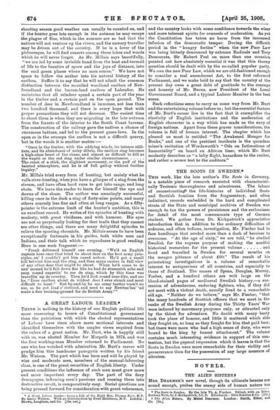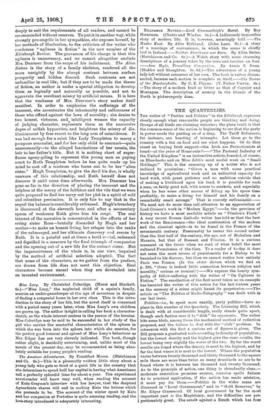NOVELS.
THE ALIEN SISTEMI'
MRS. DEARXER's new novel, though its ultimate lessons are sound enough, probes the seamy side of human nature too * The Soots in Sweden. By the late Th. A. Fischer. Edited, with an IStro- ductory Note, by J. Kirkpatrick, LL.D. Edinburgh Otto Schulze & Co. 1158.) The Alien Sisters. By Idabel Demmer. London : Smith, Elder, and Co. [Ss.] deeply to snit the requirements of all readers, and cannot be recommended without reserves. To put it in another way, while strongly pro-angelic in her sympathies, she exposes herself, by her methods of illustration, to the criticism of the writer who condemns "ugliness in fiction" in the new number of the Edinburgh Review. The gravamen of his charge is that this ugliness is unnecessary, and we cannot altogether exclude Mrs. Dearmer from the scope of his indictment. The Alien Sisters is the story of a family skeleton, rendered all the more unsightly by the abrupt contrast between surface prosperity and hidden discord. Such contrasts are not unfamiliar in real life; but if they are to be made the theme of fiction, an author is under a special obligation to develop them as logically and naturally as possible, and not to aggravate the resultant misery by artificial means. It is here that the weakness of Mrs. Dearmer's story makes itself manifest. In order to emphasise the sufferings of the innocent, she accentuates the inhumanity and callousness of those who offend against the laws of morality ; she denies to two honest, virtuous, and1 intelligent women the capacity of judging character, represents them as the successive dupes of selfish hypocrites, and heightens the misery of dis- illusionment by free resort to the long arm of coincidence. It was bad enough for a saint like Lady Templeton to marry a pompous sensualist, and for her only child to succumb—quite unnecessarily—to the alleged fascinations of her cousin, the heir to her father's title. But it is nothing short of super- fluous agony-piling to represent this young man as paying court to Ruth Templeton before he has quite made up his mind to cast off a mistress who turns out to be her "alien sister." Hugh Templeton, to give the devil his due, is wholly unaware of this relationship, and Ruth herself does not discover it until some time afterwards. Mrs. Dearmer has gone so far in the direction of placing the innocent and the helpless at the mercy of the faithless and the vile that we were quite prepared to find her carry out her plot in a spirit of cold and relentless pessimism. It is only fair to say that in the sequel the balance is considerably redressed. Hugh's treachery is discovered at the eleventh hour, and after a momentary spasm of weakness Ruth gives him his ecrnge. The real interest of the narrative is concentrated in the efforts of her erring sister Rose—brutally discarded by Hugh and her mother—to make an honest living, her relapse into the ranks of the submerged, and her ultimate discovery and rescue by Ruth. It is a painful and at times a lurid mei tal, redeemed and dignified in a measure by the final triumph of compassion and the opening out of a new life for the outcast sister. But the impressiveness of the whole is, in our view, impaired by the method of artificial selection adopted. The fact that some of the characters, as we gather from the preface, are drawn from life does not meet this objection. Real characters become unreal when they are dovetailed into an invented environment.























































 Previous page
Previous page